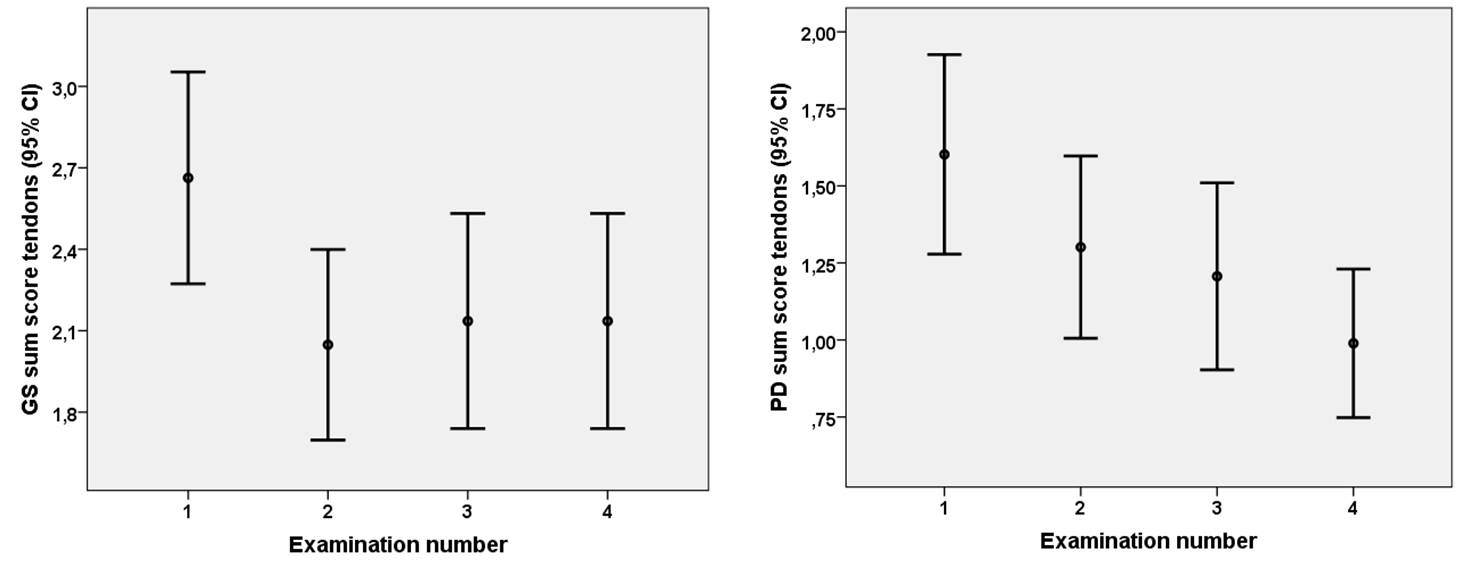Session Information
Session Type: Abstract Submissions (ACR)
Background/Purpose:
Ultrasound (US) is sensitive for detecting tenosynovitis in patients with rheumatoid arthritis (RA), where the synovitis can be assessed by grey scale (GS) and the increased vascularization by power Doppler (PD). The extensor carpi radialis (ECU) tendon in the wrist and the tibialis posterior (TP) tendon in the ankle are frequently involved in RA patients, and the tenosynovitis can be scored by use of a semi-quantitative (0-3) scoring system. The objective of the present study was to assess the involvement of ECU and TP tendons in patients with established RA as well as to explore the change in US scores of these tendons during treatment with biologic disease-modifying anti-rheumatic drugs (bDMARDs).
Methods:
A total of 181 RA patients (83% women, mean (SD) age 51 (13) years, disease duration 11 (9) years, 77 % positive for anti-CCP) were examined when they started bDMARD (infliximab 10%, etanercept 43%, adalimumab 8%, golimumab 5%, certolizumab pegol 5%, rituximab 19%, abatacept 4% and tocilizumab 6%). All were examined at baseline and after 1, 2 and 3 months with US (GS and PD of ECU and TP tendons bilaterally, all assessments performed by one sonographer (HBH) with Siemens Acuson Antares, Excellence version, using a 5–13 MHz probe with an optimized pre-setting of the machine for all examinations), laboratory and clinical assessments. The changes from baseline were assessed by use of paired samples T-test.
Results:
Tenosynovitis was found in a high number of tendons at baseline (table). The mean (SD) sum score of the four tendons was 2.7 (2.7) for GS and 1.6 (2.2) for PD, including 26% of the patients with no GS inflammation and 51% with no PD activity in any tendon. Mean (SD) baseline values for the clinical examinations were: ESR 28.6 (21.7), CRP 14.2 (20.6) and DAS28 4.6 (1.5). Both sum scores GS and PD decreased significantly from baseline to 1 month (p<0.001 and p=0.013, respectively), and both showed highly significant reduction after 3 months (p<0.001) (figure). Also ESR, CRP and DAS28 decreased already after 1 month (p<0.001 for all), as well as after 3 months (p<0.001 for all).
Conclusion:
A large number of ECU and TP tendons were inflamed at baseline, and the sum scores of both GS and PD fell significantly already after 1 month. Since tenosynovitis in ECU and TP tendons are common in RA patients and responsive to change during bDMARD treatment, US of these tendons should be considered as candidates for inclusion in future US scores of RA patients.
|
|
ECU tendons |
TP tendons |
||
|
|
Grey scale (percentage involvement) |
Power Doppler (percentage involvement) |
Grey scale (percentage involvement) |
Power Doppler (percentage involvement) |
|
Score 0 |
57 |
76 |
64 |
76 |
|
Score 1 |
21 |
11 |
15 |
9 |
|
Score 2 |
17 |
11 |
14 |
11 |
|
Score 3 |
5 |
2 |
7 |
4 |
Disclosure:
H. B. Hammer,
None;
T. K. Kvien,
None.
« Back to 2014 ACR/ARHP Annual Meeting
ACR Meeting Abstracts - https://acrabstracts.org/abstract/ultrasonographic-tenosynovitis-score-is-responsive-to-biologic-treatment-in-patients-with-rheumatoid-arthritis/

